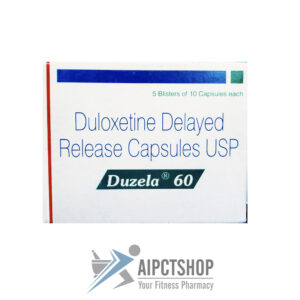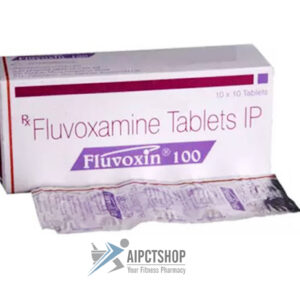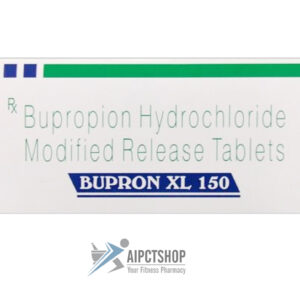Fluvoxamine is used to treat obsessive-compulsive disorder (bothersome thoughts that won’t go away and the need to perform certain actions over and over) and social anxiety disorder (extreme fear of interacting with others or performing in front of others that interferes with normal life). Fluvoxamine is in a class of medications called selective serotonin reuptake inhibitors (SSRIs). It works by increasing the amount of serotonin, a natural substance in the brain that helps maintain mental balance.
Usage directions
Fluvoxamine comes as a tablet and an extended-release capsule to take by mouth. The tablet usually is taken either once daily at bedtime or twice daily, once in the morning and once at bedtime. The extended-release capsule usually is taken, with or without food , once daily at bedtime. Follow the directions on your prescription label carefully, and ask your doctor or pharmacist to explain any part you do not understand. Take fluvoxamine exactly as directed. Do not take more or less of it or take it more often than prescribed by your doctor.
Swallow the extended-release capsules whole; do not be crush or chew them.
Your doctor may start you on a low dose of fluvoxamine and gradually increase your dose, not more often than once every week, depending on how well the medication works for you and the side effects you experience.
It may take several weeks or longer for you to feel the full benefit of fluvoxamine. Continue to take fluvoxamine even if you feel well. Do not stop taking fluvoxamine without talking to your doctor. If you suddenly stop taking fluvoxamine, you may experience withdrawal symptoms such as irritability; agitation; dizziness; extreme worry; uneasiness; confusion; headache; tiredness; mood changes; difficulty falling asleep or staying asleep; or pain, burning, numbness, tingling or ‘electric shock’ sensations in the hands or feet. Your doctor probably will decrease your dose gradually.
Other uses
Fluvoxamine is also used sometimes to treat depression. Talk with your doctor about the possible risks of using this medication for your condition.
This medication is sometimes prescribed for other uses; ask your doctor or pharmacist for more information.
Special precautions
Before taking fluvoxamine,
- tell your doctor and pharmacist if you are allergic to fluvoxamine, any other medications, or any of the ingredients in fluvoxamine tablets and extended-release capsules. Ask your doctor or pharmacist for a list of the ingredients..
- tell your doctor if you are taking alosetron (Lotronex), astemizole (Hismanal) (not available in the U.S.), cisapride (Propulsid) (not available in the U.S.), pimozide (Orap), ramelteon (Rozerem), terfenadine (Seldane) (not available in the US), tizanidine (Zanaflex), or thioridazine. Your doctor will probably tell you not to take fluvoxamine.
- tell your doctor if you are taking the following medications or if you have stopped taking them within the past 14 days: monoamine oxidase (MAO) inhibitors such as isocarboxazid (Marplan), linezolid (Zyvox), methylene blue; phenelzine (Nardil), rasagiline (Azilect), selegiline (Eldepryl, Emsam, Zelapar), and tranylcypromine (Parnate). Your doctor will probably tell you not to take fluvoxamine. If you stop taking fluvoxamine, you should wait at least 14 days before you start to take an MAO inhibitor.
- tell your doctor and pharmacist what prescription and nonprescription medications, and vitamins you are taking or plan to take. Be sure to mention any of the following: alprazolam (Xanax); anticoagulants (‘blood thinners’) such as warfarin (Coumadin); aspirin or aspirin-containing products and other nonsteroidal anti-inflammatory drugs such as ibuprofen (Advil, Motrin) and naproxen (Aleve, Naprosyn); beta-blockers such as metoprolol (Lopressor, Toprol) and propranolol (Inderal, in Inderide); buspirone (BuSpar); carbamazepine (Tegretol); clopidogrel (Plavix), clozapine (Clozaril); cyclosporine (Neoral, Sandimmune); dextromethorphan (in cough medications); diazepam (Valium); diltiazem (Cardizem); diuretics (‘water pills’); fentanyl (Abstral, Actiq, Fentora, Onsolis, others); haloperidol (Haldol); ketoconazole (Nizoral); lithium; medications for migraine headaches such as almotriptan (Axert), eletriptan (Relpax), frovatriptan (Frova), naratriptan (Amerge), rizatriptan (Max
alt), sumatriptan (Imitrex), and zolmitriptan (Zomig); methadone (Dolophine, Methadose); mexiletine (Mexitil); metoclopramide; midazolam (Versed); omeprazole (Prilosec, Zegerid); other medications for anxiety, depression, or mental illness; phenytoin (Dilantin);sibutramine (Meridia); tacrine (Cognex); theophylline (Theo-Dur); tramadol (Ultram, in Ultracet); triazolam (Halcion); and quinidine. Your doctor may need to change the doses of your medications or monitor you carefully for side effects. - tell your doctor what herbal products and nutritional supplements you are taking, especially products that contain St. John’s wort and tryptophan.
- tell your doctor if you drink or have ever drunk large amounts of alcohol or have used street drugs or have overused prescription medications. Also tell your doctor if you have or have ever had seizures, or heart, kidney, adrenal, or liver disease.
- tell your doctor if you are pregnant, especially if you are in the last few months of your pregnancy, or if you plan to become pregnant or are breast-feeding. If you become pregnant while taking fluvoxamine, call your doctor. Fluvoxamine may cause problems in newborns following delivery if it is taken during the last months of pregnancy.
- if you are having surgery, including dental surgery, tell the doctor or dentist that you are taking fluvoxamine.
- you should know that this medication may make you drowsy or affect your judgment, thinking, or motor skills. Do not drive a car or operate machinery until you know how this medication affects you.
- remember that alcohol can add to the drowsiness caused by this medication. You should not drink alcohol while taking fluvoxamine.
- tell your doctor if you use tobacco products. Cigarette smoking may decrease the effectiveness of this medication.
Food limitations and special diet when taking Fluvoxamine
Unless your doctor tells you otherwise, continue your normal diet.
Missed dose
Take the missed dose as soon as you remember it. However, if it is almost time for your next dose, skip the missed dose and continue your regular dosing schedule. Do not take a double dose to make up for a missed one.
Possible side effects
Fluvoxamine may cause side effects. Tell your doctor if any of these symptoms are severe or do not go away:
- drowsiness
- difficulty concentrating, memory problems, or confusion
- dry mouth
- headache
- nausea
- vomiting
- diarrhea
- stomach pain
- constipation
- indigestion
- gas
- change in taste
- decreased appetite
- weight loss
- nervousness
- weakness
- unsteadiness
- changes in sex drive or ability
Some side effects can be serious. If you experience any of the following symptoms, or those listed in the IMPORTANT WARNING section, call your doctor immediately or get emergency medical treatment:
- chest pain
- problems with coordination
- dizziness
- hallucination (seeing things or hearing voices that do not exist)
- fever, sweating, confusion, fast or irregular heartbeat, and severe muscle stiffness
- pain, burning, numbness, or tingling in the hands or feet
- shaking of a part of the body that you cannot control
- rash
- hives
- slowed or difficult breathing
- seizures
- loss of consciousness
- unusual bleeding or bruising
- bloody nose
- vomiting blood or a material that looks like coffee grounds
- red blood in stool or black and tarry stools
Fluvoxamine may cause other side effects. Call your doctor if you have any unusual problems while you are taking this medication.
Storage and disposal of Fluvoxamine
Keep this medication in the container it came in, tightly closed, and out of reach of children. Store it at room temperature and away from excess heat and moisture (not in the bathroom). Throw away any medication that is outdated or no longer needed. Talk to your pharmacist about the proper disposal of your medication.
Emergency/overdose
In case of overdose, call your local poison control center. If the victim has collapsed or is not breathing, call local emergency services.
Symptoms of overdose may include:
- enlarged pupils (black circle in center of eye)
- unsteadiness
- dizziness
- drowsiness
- nausea
- vomiting
- diarrhea
- difficulty breathing
- changes in heartbeat
- shaking of a part of the body that you cannot control
- seizure
- changes in alertness
- loss of consciousness
Other important information
It is important to keep all appointments with your doctor and the laboratory. Your doctor will order certain lab tests to check your response to fluvoxamine.
Do not let anyone else take your medication. Ask your pharmacist any questions you have about refilling your prescription.
It is important for you to keep a written list of all of the prescription and nonprescription (over-the-counter) medicines you are taking, as well as any products such as vitamins, minerals, or other dietary supplements. You should bring this list with you each time you visit a doctor or if you are admitted to a hospital. It is also important information to carry with you in case of emergencies.
Disclaimer
We provide only general information about Fluvoxin which does not cover all possible drug integrations, directions or precautions. Information at our website cannot be used for self-treatment and self-diagnosis. Any specific instructions for a particular patient should be agreed with his health care adviser or doctor in charge of the case. We disclaim reliability of this information and mistakes it could contain. We are not responsible for any direct, indirect, special or other indirect damage as a result of any use of the information on this site and also for consequences of self-treatment.







Reviews
There are no reviews yet.